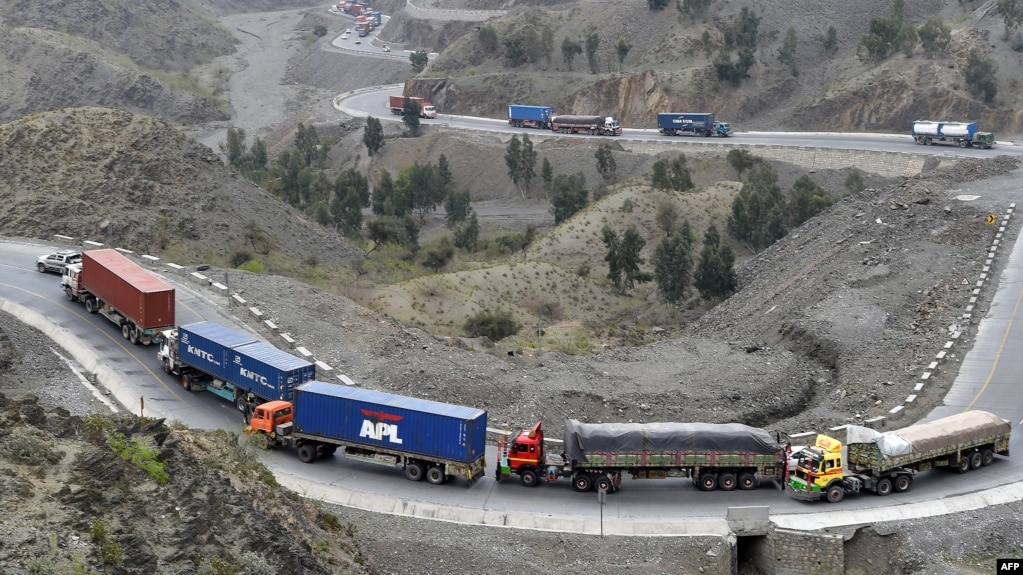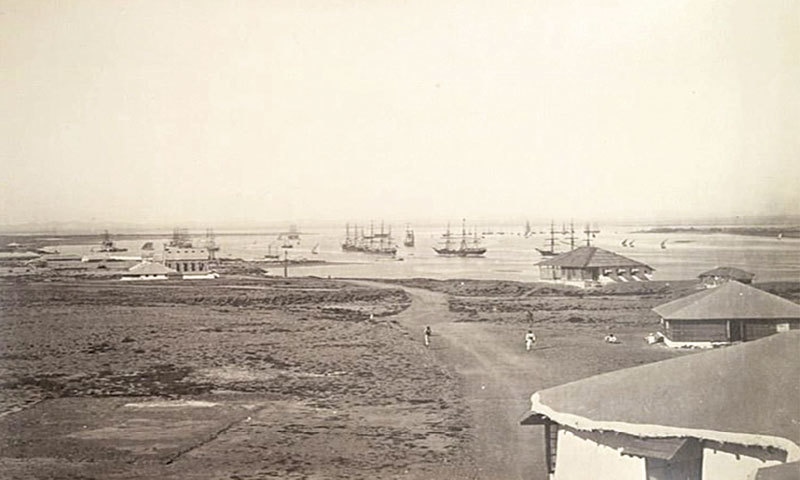
Pakistan has allowed a private Indian trader to export commercial goods to Uzbekistan as part of the trade activity between New Delhi, Islamabad, Kabul and Tashkent.
At least 140 tons of cargo, mostly Indian sugar, crossed over into Pakistan and travelled to Afghanistan through the Torkham border. The shipment was sent ahead towards Uzbekistan’s capital Tashkent.
Monitoring Desk
Islamabad/Kabul/Tashkent
Karachi, which has a history spanning over 2500 years, has maintained its importance not only as the commercial hub but also as the seaport to carry out trade activities for landlocked countries including Afghanistan and Central Asian States.
Very recently, such development has taken place, as for the first time Indian cargo was exported to Uzbekistan via Karachi Port. Pakistan has allowed a private Indian trader to export commercial goods to Uzbekistan as part of the trade activity between New Delhi, Islamabad, Kabul and Tashkent.
According to foreign media reports, at least 140 tons of cargo, mostly Indian sugar, crossed over into Pakistan and travelled to Afghanistan through the Torkham border. The shipment was sent ahead towards Uzbekistan’s capital Tashkent.
The reports quoted Maulana Zaheer, spokesperson of Afghanistan’s Ministry of Industry and Commerce, as saying that a special ceremony was organized to facilitate the transit of Indian goods in Kabul.
“The shipment arrived in Kabul a day earlier from Pakistan via Torkham border crossing. The ministry organized a ceremony to facilitate the transit of Indian goods.”
“This is a major step towards turning Afghanistan into a key trade link between Central and South Asia,” he added.
The cargo had originated from Mumbai and had travelled through the Karachi seaport in March, where the Uzbek importer received it. The cargo was loaded into trucks from Karachi and sent towards the Torkham border into Afghanistan after which it traveled to Uzbekistan.
“This was done as under the recently inked bilateral transit trade agreement between Pakistan and Uzbekistan,” said a Pakistani official.
The agreement was signed during the visit of Uzbek President Shavkat Mirziyoyev, during which, several bilateral trade agreements were mutually agreed and materialized.
“The Uzbekistan-bound Indian commercial consignment was a privately arranged activity under the agreement and had no government involvement from any of the four countries,” stated the Pakistani official.
“It will not become a regular activity, and Uzbekistan will be able to import goods from anywhere through Pakistani seaports.”
The official also revealed that the Taliban-led government in Afghanistan is bound to facilitate trade activity and Uzbekistan also has the right to access Pakistani ports for international trade, having the same right that is facilitated for Afghanistan.
Pakistan has allowed Afghanistan to use its ports and air routes to carry out its trade activities from other countries.
This facilitation is provided as part of the Afghanistan–Pakistan Transit Trade Agreement (APTTA), which allows Afghan traders to export their goods to India via Pakistan’s land, air and sea routes.

However, the Afghan traders can only import through Pakistan’s seaports because of the tense relations between the two countries.
Another report suggests that under the APTTA, Afghan traders are allowed to export their goods to India through Pakistani land, air and sea routes, but they can import Indian goods only through seaports because of strained ties between Islamabad and New Delhi.
However, Pakistan recently allowed India to use its land routes to transport 50,000 tons of wheat that New Delhi had donated in humanitarian assistance to Afghanistan, where millions of people face acute hunger, the report added.
According to other reports a Pakistani cargo truck transported medicine from the port city of Karachi on April 9, 2021 to the Uzbek capital, Tashkent, via Kabul. It arrived on May 4. An Uzbek cargo truck then took a shipment of leather products from Tashkent on May 9 and arrived at the Afghan-Pakistani border (Torkham crossing) on May 11. It then was trucked to Faisalabad on May 13, 2021.
The shipments were part of five planned trial runs aimed at testing the viability of various routes in the region, where trade has been hampered by the decades-old conflict in Afghanistan and longstanding diplomatic tensions between Kabul and Islamabad.
The project has received technical and financial support from the United States Agency for International Development (USAID). The agency said the initiative is intended to “boost regional trade integration and connectivity.”
The shipments were made under the Transports Internationaux Routiers (TIR) Convention, a customs agreement that facilitates the international transport of goods. The multilateral treaty eliminates the need to pay customs duties and taxes. Afghanistan rejoined the TIR after a 30-year suspension in 2013, while Pakistan joined in 2017.
William Byrd, a development economist at the United States Institute of Peace, a Washington-based think tank, says the pilot project is an “encouraging development” but “more a proof of concept than a milestone.”
“If this gets taken forward by expanding to other Central Asian countries and is scaled up over time in terms of the volume of transit trade, there will be important benefits for both Pakistan and Central Asia,” says Byrd. “If this transit trade develops on a larger scale, it will also increase the economic stakes of neighboring countries in Afghanistan’s peace and stability.”
Afghanistan’s neighbors have a long history of funding proxy groups in the decades-long conflict. Pakistan is the Taliban’s main foreign backer, while Iran and Russia have expanded ties with the militant group in recent years.
Abdul Razak Dawood, then Pakistani Prime Minister Imran Khan’s adviser on commerce and investment, had termed the pilot project as “very successful.”
“Our objective is to have greater connectivity with our western and northern neighbors,” Dawood had told RFE/RL’s Radio Mashaal. “So, we are very encouraged. We want to do more [trade].”
Pakistani media reports said Islamabad wants to import more Uzbek goods, including coal, fertilizers, and textiles.
The Pakistani transport company Best Trans Pvt. and Uzbek freight-forwarding company Asad Trans — the two firms involved in the project — plan to boost the number of trucks carrying cargo to Pakistan and Uzbekistan to 50 by the end of the year.
Landlocked Uzbekistan would one of the biggest beneficiaries of greater regional trade.
Uzbekistan’s access to marine shipping is very limited, and Tashkent has sought to secure a direct link to seaports in Pakistan and Iran.
In February 2021, Afghan, Pakistani, and Uzbek officials signed a road map on the construction of a railroad from Afghanistan’s northern city of Mazar-e Sharif, near the Uzbek border, to Kabul and the northwestern Pakistani city of Peshawar.

This harbor used to be the final destination of ancient Silk Route for carrying out trade with African countries and Middle East. When the British took its control in 1839, it had developed the port of Karachi because its strategic location made it a gateway for trade with the northern states of the sub-continent as well as the Central Asian States. The harbor improvements went on through the latter half of the 19th century and included the Manora breakwater and the construction of the lighthouse.
Its history prior to the 18th century as a port on the Arabian Sea north-west of the mouth of the Indus is largely unrecorded, but it is believed to be ancient. It has been identified as Krokala, the port visited by Alexander’s fleet in 326 BC, is noted in a collection of 16th century Turkish sailing directions, and was transformed from a fishing village (Kolachi-jo-Goth) to a trading post under the Kalhora and Talpur rulers of Sindh in the 18th century when a mud fort was also built. However, it remained modestly sized until the British conquest of Sindh in 1843.
The later history of Karachi Port during the British Raj and after the creation of Pakistan is an open book. It has been major seaport for import of goods for landlocked provinces of Pakistan as well as Afghanistan.
________________
Source: KalingaTV, Gandhara and other websites